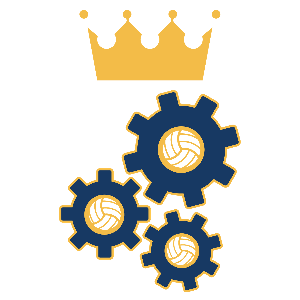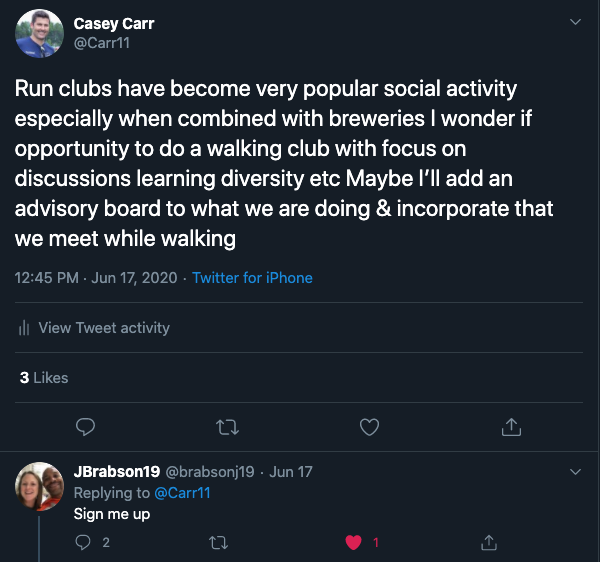How a Simple Walk Changed Everything
The COVID-19 pandemic of 2020 has been devastating to many people. It has taken lives, hurt the economy, cost people their jobs, their businesses and forever altered the way we live and operate. During the pandemic we’ve also seen how important the fight against systematic racism and social injustice are. The world watched in horror at the murder of George Floyd, Breonna Tayler, Jacob Blake and far too many others.
Despite the devastation and despair wrought by the pandemic and what easily is one of the worst years (2020) in recent history, a silver lining has been the ability to spend more time with family and close friends, and having time to evaluate, think, and as Killer Mike so eloquently put it - Plot, Plan, Strategize and Mobilize.
The loss of life and livelihoods have forced many of us to look in the mirror, and confront difficult questions about our roles in the fight against social injustice, our goals, who we are, our relationships, our businesses and more. During the initial phase of the pandemic we found ourselves stuck at home, bemoaning the quarantine and wondering just how long the seemingly draconian measures would last. Then the blatant murder of George Floyd rocked the world as the video of his death unfolded on social media. While the roll call of death for black men and women has marched on inexorably for hundreds of years and only deepened the hurt for people of color, for many whites, like me, it sparked the long overdue need to do some serious soul searching.
While the businesses my wife and I had painstakingly built during a 10-year period evaporated overnight, I was plagued and consumed with the stark reality that I – and people like me – had not done nearly enough and for far too long were oblivious to the painful reality encountered daily by people of color. The questions kept circling: What role have I played in this systematic racism in the past? What role am I playing now? What should I say? What should I do? Despite getting hammered by the COVID-19 shutdown, we would survive.
Thoughts raced through my mind about my kids, their friends, my extended family, former colleagues, teammates, and more. How did we get here? How can this keep happening? These thoughts consumed me In comparison to the fear and horror experienced by a man begging for and ultimately losing his life, the business tumult we faced was inconsequential. And that’s when it started. I took a walk, and then another, and then another. I needed to clear my head, needed to get outdoors, needed to think. What I found is that a simple act of walking and moving was having positive impacts on me mentally. Sometimes I listened to music, other times a book, sometimes a podcast. Learning, walking and thinking became addicting.
The real change for me came after a walk and I posted this tweet.
The reply from Jonathan of “sign me up” was all the confirmation I needed. We set up a walk and that walk helped change everything for me.
Our first walk was at Col. Francis Beatty park. We didn’t have a plan, a script, or conversations planned but what happened on that walk was incredible. We had discussions about everything from our family and our kids to youth soccer and social injustice. I learned that day that my friend Jonathan asks incredible questions, is unafraid to go deep, to push, to help people go further – an attribute that I believe is critical today more than ever. A simple question that started with, “So, what are you guys doing at Stumptown about social injustice?” took us down an incredible conversation that included what fighting injustice meant to each of us, where we grew up, how that shaped our thoughts today, what we were doing individually, what was bothering us, etc.
That walk was the starting point of more walks, more conversations with new people, a conviction that we had to do more, that these walks were more than walking. They were something we had to do. A brotherhood was formed. As luck or divine intervention would have it, a week later I found myself doing a soccer camp focused on using the game of soccer to give back to children in Charlotte and South Africa with Nazeem Bartman. (Nazeem has an incredible story of his own. If you want to hear more check out this interview.) The proceeds from the camp in Charlotte were going to give hope to children in Cape Town South Africa. While kids in Charlotte learned the game, they also learned about other cultures, about privilege and more.
During one of the first days of camp we ran into Brandon Miller, currently the starting goalkeeper for the USL’s Charlotte Independence. I recognized Brandon immediately. Brandon has been and continues to be a vocal leader in the soccer and Charlotte community in the fight against social injustice and systematic racism. I knew that what Brandon and Nazeem were doing were connected, and that putting more people in the room who are trying to do good through the game of soccer had to happen. While introducing them I invited both to join Jonathan and I on one of our walks.
Our next walk included all four of us and the conversations were powerful, motivating and continue to this day. Jonathan, Brandon and I continue to walk, continue to push each other to do more, to invite others. Brandon has been instrumental in establishing the Black Players Alliance of the USL, in bringing attention to Heal Charlotte, an organization focused on community engagement, wellness and growth for the youth of Charlotte. He also is building his own goalkeeper glove and training business, Prime Focus Goalkeeping.
As current or former athletes, we realize that our best growth often comes from putting ourselves in uncomfortable situations. We design sessions that force us to play under pressure, to make decisions at speed. We understand that growth occurs when the heat is on and in the tumble of daily life, not in a hot house. Science also tells us that when people are uncomfortable, they often feel like they need to move. This is where the power of the walk becomes evident. While walking for us is not strenuous, it does create a safe place, one that allows for us to push ourselves into uncomfortable conversations. On a walk there is nowhere to hide, but since we are moving, it feels safe. It feels much more comfortable when someone asks a tough question and it feels safe to ask a tough question or to be vulnerable enough to answer one. This is critical. By being comfortable with the uncomfortable we are able to grow, develop and become change agents.
I don’t know where these walks will lead, what questions will come, or what conversations we will have. What I do know is that the direct impact for me has been to develop some important initiatives around voting, to be more vocal and intentional when fighting social injustice, to build a business focused on working with athletes and helping them grow and build their businesses. It’s motivated me to act more decisively regarding social justice within my own companies, and to ask more questions while I listen, learn and seek out others who want to join us in being engaged in anti-racism work in my community. The walks have been an incredible blessing, and I’d like to thank my friends Jonathan and Brandon for helping to push us all forward. Without them this would not have happened.
Finally, I encourage everyone to take a walk, invite a friend and then invite another. Ask questions, listen, connect. Ask the tough questions about systemic and structural racism, about power and opportunity, about oppression and privilege, about having to teach your sons to stay alive during a police-stop while knowing it might never be enough – and what it means when those concerns never even cross your mind.
If you live in Charlotte and want to join us on our next walk, connect with us via email, or on social media.
Either way, I hope you take a walk.


